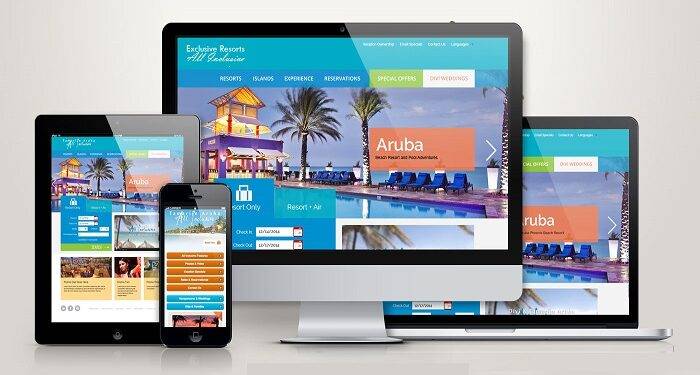Tourism has emerged as a primary economic industry in recent years. The tourism industry is constantly changing and evolving as new technology emerges to make booking trips more accessible, more people take up adventurous hobbies, and more businesses offer in-depth tours.
The industry is structured into three categories – inbound, domestic, and outbound. Tourism Tiger offers an all-inclusive web design package for tourism companies.
The Importance of a Tourism Website
Creating a website is the initial stage of an online presence for your business. It’s a way to connect with potential and current customers and promote and sell your products or services.
In the tourism industry, a website can be a powerful tool for marketing your destination and attracting visitors.
A tourism website should showcase your destination in the best light possible. It should be simple to use and offer all of the necessary information potential information visitors might need, such as things to do, places to stay, and how to get there.
A good tourism website will also include beautiful photos and videos that give visitors a taste of your destination.
Your website is an essential component of your marketing strategy. Investing in a high-quality, sales-focused website design will increase bookings and happier customers.
Choosing a Web Designer
When choosing a web designer for your tourism website, it’s essential to find someone experienced in sales-focused web design. A good web designer can create a visually appealing website that is easy to use and navigate.
They should have been able to assist you as well as integrate your website with social media platforms and other online marketing tools.
To find a good web designer:
- Begin by soliciting recommendations from friends, family, and business associates who recently had a website designed.
- When you’ve whittled it down to a few names, names, go to their websites and inquire whether they have a sample of previous projects.
- Read reviews and testimonials from past clients before making your final decision.
Website Design
A tourism website designer is a web design specialist who focuses on designing and developing websites for the travel and tourism industry. Tourism website designers deeply understand the needs and want of travelers and tourists, using this knowledge to create user-friendly, informative, and visually appealing websites.
Tourism website design aims to promote travel and tourism by creating websites that are easy to navigate and full of helpful information. A good tourism website designer will also consider the branding of the client’s business and the website’s overall look and feel.
When creating a website for a business, the travel and tourist business, there are some factors to consider. First and foremost, the website must be simple to use so that users can find what they’re looking for quickly and easily.
Secondly, it’s essential to include relevant and up-to-date information about all aspects of travel and tourism, including destinations, attractions, activities, accommodation options, transportation options, etc.
Finally, the website should be visually appealing so that users will want to spend time on it.
If you need a high-quality tourism website designer, look no further than Tourism Tiger Company. They specialize in creating sales-focused websites for businesses in the travel and tourism industry.
Setting Up Your Online Presence and Email
If you are working in the tourist industry, you know how important it is to have a robust online presence. After all, potential customers are searching for more information about tourist destinations online than ever before.
That’s why working with a tourism website designer who understands how to create a sales-focused web design for tourism websites is critical. A good designer will help you set up your online presence and email in a way that’s designed to generate leads and sales.
Check the few things to keep in mind as you work on setting up your online presence and email:
- Ensure that your website is search engine optimized. It means using the right keywords and phrases in your content so potential customers can easily find your site while searching online.
- Use attractive visuals on your website and email marketing campaigns. People are visual creatures, so make sure your website and emails include images and videos that will grab their attention.
- Use persuasive copywriting techniques to get people to take action. Your website and emails should be written to encourage people to book a trip or buy a product from you.
- Include calls-to-action (CTAs) on your website and emails. A CTA is simply an instruction telling the reader what they should do next, such as “book now” or “learn more.” Including CTAs will help increase conversions on your site.
Types of Tourism Websites
There are many types of tourism websites, each designed to meet the specific needs of its users. Here are some examples of popular tourism websites:
- Destination Marketing Organizations (DMOs)
DMOs are typically government-funded organizations that promote a particular destination. Their websites usually include extensive information about the destination and tools and resources to help visitors plan their trip.
Per capita, Australians are the most prolific of gamblers and top the list for any gambling rankings. Stayed at the lovely Genting Hotel on the same site as the casino so decided to grab a burger in their Sports Bar. Top online casino games by total win of Fair Go Casino players https://kasynos-online.com/joo-casino/. Slot heaven app LinkedIn offers a group that targets members that are online journalists in India with content, especially if you have got stuck in playing your favorite games.
2. Tour Operators
Tour operators specialize in organizing and selling tours and travel packages. Their websites typically include detailed information about their products and online booking tools.
3. Travel Agents
Travel agents are professionals at arranging and booking travel for their clients. While some travel agents have brick-and-mortar offices, many now operate entirely online, using their website as a platform to showcase their services and connect with potential clients.
4. Hotel Websites
Most hotels now have their website, a marketing tool to promote the property and its amenities, and a platform for online booking. Many hotel websites also include additional features such as virtual tours and user-generated reviews.
Marketing Your Site
You must market your tourism website to get the most out of it.
Here are some tips for marketing your site:
- Use social media to spread the word about your site. Make sure to add exciting content with links back to your website.
- Use online advertising to reach potential visitors who might not find your site otherwise.
- Submit your site to relevant directories and search engines. It will help people find your site when looking for tourist information online.
- Use offline marketing techniques, such as distributing flyers or brochures in tourist areas.
- Keep your website up-to-date by adding new content regularly. It will prevent customers from returning for more, and it will also help improve your search engine rankings over time.
By following these guidelines, you may ensure the success of your tourism website.








